#bell krater
Text

Hermes pursuing a woman, probably Herse, Lucanian red-figure bell-krater, ca. 390–380 BC
Louvre
12 notes
·
View notes
Text
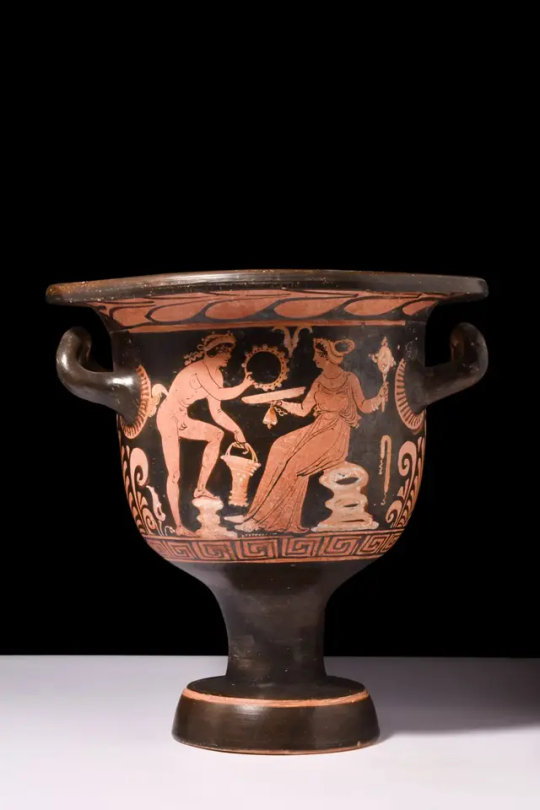
APULIAN RED-FIGURE BELL KRATER
Ca. 400-300 BC
#APULIAN RED-FIGURE BELL KRATER#Ca. 400-300 BC#terracotta#greek terracotta#ancient artifacts#archeology#archeolgst#history#history news#ancient history#ancient culture#ancient civilizations#ancient greece#greek history#greek art
304 notes
·
View notes
Text

Apulion red figure bell krater, Greece, 375-350 BC
from The J. Paul Getty Museum
204 notes
·
View notes
Text
Delicate Is The Flesh - Chapter 6
- Synopsis: On the brink of the bustling new city of Rosholt lies a forgotten palisade of abandoned homes, shops and streets that sit mummified after a chemical outbreak in the 70s, leaving the city uninhabitable.
Over the years however, the place has become a hotspot for urban explorers and crime junkies alike.
Whispers of reanimated bodies stalking the dead streets and brutal murders worm their way into your friend's ears and, having nothing to do on your Winter break, you reluctantly agree to go exploring the abandoned city with them.
What could go wrong, right?
- Chapters ->
Prologue
Chapter 1: For Whom The Bell Tolls
Chapter 2: Corvus and Krater
Chapter 3: Belly of the Beast
Chapter 4: Something Forgotten
Chapter 5: Citrus and Cinnamon
Chapter 6: Mumbling Conscious (you're already here!)
- Obessive!Demon OC/Reader
- Word Count (for chp): 6.9k
- Warnings (for chp): None.
- Ao3: https://archiveofourown.org/works/55444003/chapters/150657787


“So, are you sure you don’t want to tell me about this little love story of yours now?”
Helen giggles softly behind you. It echoes loudly in the cracking concrete bowels you trek through.
“Yes. I can assure you, the only way you will be hearing it is if you come back to Greece with me.” Something snaps under someone’s foot, either glass or the dried remains of some bug.
You both know very well it’s a thinly veiled act of persuasion, a not-so-subtle play on your curiosity. So, somewhat determined to get whatever she had been keeping secret out of her, you put on your best pout and turn to her.
She walks right past you.
Shaking her head back and forth with a hidden knowing smile, she replies, “Making sad faces will get you nowhere, I am afraid.”
“So mean…” you grumble. Considering Helen's typical openness in her thoughts and experiences, you were genuinely intrigued. While it wasn’t mandatory, it was rare she’d hide topics she’d happily chatter about if given the chance. That said, your main aim–hidden under glass and dust–was simply to keep a conversation going. You’ve learnt very quickly that you don’t like the silence here, either. For both of your benefit, you’d much rather keep aimless chatter bouncing off the walls instead of some distant radio show. Keep your mind focused on replies and not the sickly sweet stench of flowers blooming in the middle of winter.
Of empty sockets that stare right at you.
Helen shoots a hand out, “Careful.” Puzzled, you send her a confused glance.
However, the moment she puts a foot down on the wood, you get your answer: the floorboards creaking and groaning loudly with the simple weight. While it wasn’t unexpected–every step you’d taken for the last hour or so had been accompanied by a loud squeak–what catches your attention is how far the wood visibly bends. That, and how damp it is. Damp enough that the moisture shines under the light of your torches.
Stretching your own leg out to test them, you’re unsurprised to now physically feel how deeply they bow under your weight; whining something foreboding with each kilo you put down. Through the soles of your shoes, you can practically feel the fibres cracking.
You sigh to yourself, half out of exasperation and something else you can’t quite pin down.
Looking up from the rotting floor, you’re not surprised to see the rest of the story was in a similar state.
More household items are scattered across the main hall: old stuffed animals poking their saturated heads out of screeching doors. Legs, maybe once holding up sturdy tables, lean against the walls. Sodden, deflated cushions lying haphazardly on the floor slowly melt into the woodwork; plush becoming indistinguishable from the flooring.
All create a waterlogged tapestry of the past.
The wallpaper, colours faded and mixed with old graffiti not unlike a fresh watercolour, reappear in diseased patches across the walls. Even vines from downstairs creep and crawl through the crumbling structure, anchoring themselves to whatever they can find. From the withering leaves, however, you guess they aren’t having as much success as they are downstairs.
A floorboard wails loudly from beside you. “This does not look too good.” She steps forward–really only a half-step–and begins to test the strengths of the planks in front of you. Then, she takes a full one forward with sounds from the floor that have you partially reaching your hands out, as if to catch her. You watch with a building level of unease as she attempts to spread out her weight.
Even the air is heavy. Heavy with the calm before a storm: petrichor and an electric buzz that lets you know you shouldn’t be here. Somehow, it overpowers the dust–which you’re sure sits in foetid clumps wherever the rain and wind sees fit–and worms its way into your lungs.
It’s nothing like the air downstairs: while that was fresh, still holding hints of petrichor, this was thick. Like oil. It’s somehow worse than the stagnant air from the basement.
Eyeing the wood, you hesitantly do the same. “Yeah.”
Something viscous is at the back of your throat. Tastes like how decaying autumn leaves smell.
The thin walls–either on this floor or one of the many others–waver in the wind, and you’re starting to affirm to yourself that Jeanne’s promise of the place being ‘structurally sound’ was another one of her half lies.
Four floors high, including the ground floor–five with the addition of the basement–and you’re sure you’d snap your neck. Bleed out on that ugly cream carpet with wooden wings splayed out beside you. Your only consolation is that you’re pretty sure that the main structure is made of solid concrete, sitting silently under the wood.
The gaping plaster wounds in the walls–rippling wooden muscles and creaking metal bones taught underneath–make you doubt yourself.
At best, you’d break or twist an ankle. At worst, you’ll be a bloated carcass strangled by weeds. A rotting warning to all those who enter.
No way in Hell is this safe.
You take a few more cautious steps forwards, ears perked for the tell-tale noises of crumbling wood that would rather collapse than hold your weight. “If the rest of the floors are like this, I say we stop.” One creaks loudly, a bit too loud for your taste, and you take one backwards. “Wouldn’t be surprised if we fell straight through.”
Helen’s head lowers to stare at the floor, probably contemplating whether the risk of going crashing through four or five stories was worth taking the chance. “I think,” she takes a step forward, graceful as an onyx chess piece slid across the board. “We will be okay.” She turns to you, optimism in her eyes. It makes your shoulder sag. “We just have to keep our eyes out for any wood that is especially dark, or looks wet on the surface.” Another step forward, and you sigh as you begin to follow behind, dutiful as ever. “Is that okay?”
Kind of hard to do when all the wood looks wet, you think. Even so, you keep your nervous thoughts concealed beneath a cool facade. “Whatever you say,” you feel the cold of the water sink into your soles. “You’re paying my hospital bills if I break something, though.”
It’s sarcasm, but she still takes it somewhat seriously. “It would be my fault, so I would not mind.” She shrugs, before pausing, her weight spread between a few different planks. Then she raises her flashlight.
The centre-piece window–which never fails to draw your eye–is broken: jagged teeth glinting in the light.
A soft hum glides up her throat, “The wind and the rain from the North probably comes in here quite harshly: it is no wonder this place is so wet. Either way, I am surprised this place hasn’t fallen like, what is it- paper mache?”
It’s a simple description, one you’d easily take for an answer if not for one simple fact: both windows on the other floors were broken. Both windows faced North, as all the rest of the windows above you.
So why weren’t those as dilapidated as this one?
Wearily, you take a few more steps, trying to follow her invisible pattern of semi-promised safety. “But what about-” that is, before your feet knock into something. Something solid.
Expecting the worst, you look down with a strained look on your face. You’re met with the sight of a porcelain doll. The pale, once pretty, type you almost always see in charity shops.
And horror movies.
Part of its silky pallor is cracked and smashed in, leaving an empty void where half its face used to be. Curly blonde hair frames what’s left of it, fading blue eyes rolled absently to the side.
“Are you scared of it?”
There’s a bit of blush on its face, too. Faded, like everything else is at the hands of time and neglect, but still there.
“What?”
It reminds you of something freshly dead. Eyes and body empty, yet still holding onto the warmth in its fingertips.
Helen crouches down in front of it, repeating herself. “Are you afraid of it?”
You’re surprised the wood holds her weight.
Before you can say anything–let a garbled and probably incoherent answer out of your mouth–she picks it up. Handles it more like a living baby rather than a porcelain resemblance. When she cradles its head, resting stiffly in her palm, one of its eyes rolls. Rolls out of its vacant skull to stare right at you. Glossy and unblinking and reflecting flashing blue and yellow that blinds you.
Beneath light fatigue and a growing sense of alarm that refuses to go away, something rings.
“You’ll get a demon or something attached to you if you hold on to it.” You joke, eyes darting up from the glass one you’re sure sees right through your skin. Or, maybe, sees right past you.
She takes your avoidance as an unspoken yes. She isn’t wrong: if you saw that thing at the end of your hallway in the middle of the night, you’d happily give your apartment up to it.
She fiddles with the stained lace that edges the sleeves and the hem of the forget-me-not dress. “Why?”
It’s a good question–like all of her questions are. You roll thoughts around in your head, seeing how they taste on your tongue. You’d say it’s something embedded in you; embroidered into the intricate tapestry of each twitching muscle and thumping pulse of your heart. You’re afraid of the doll the same way something in the back of your mind, a knowing voice neither old nor young–simply alert–tells you to be afraid of the dark. Tells you to be wary of things that creep and slide.
Tells you to be fearful of things that try to be human.
“Probably because I’ve watched too many shitty horror films with Jeanne.” You reply. Helen simply shakes her head, and you think she knows you aren’t telling the entire truth. Either way, she doesn’t bother to pry a more self-aware answer out of you.
Gingerly, she places the doll back down where she’d found it. Its eye rolls back up into its head, having seen enough. For a few brief moments, you don’t blame it. The untouchable night that resides in its hollow head is probably a more comforting view compared to the sodden floorboards.
Both of you carry on with your hushed agreement to explore the other apartments. Helen glides across the floor with wisp-like grace, barely making a noise, while you stumble over each creaking floorboard and spend every two seconds wondering if you’re going to fall.
You stagger through a few different apartments, eyes skimming over whatever was visible and then moving on, more focused on not falling than searching for anything of interest.
After traversing the hall somewhat aimlessly–chattering to Helen along the way–you find your way into another apartment. One side of the floors has swollen, and the entire place reeks of festering mould.
A question strikes your mind, worming its way out of your mouth as the conversation threatens to fall flat. “Hey, Helen?”
With growing confidence, you carefully step forth. The living room is lifeless; void of any furniture. It also happens to be the side where the floors rise–something very old and very slow trying to breach the surface–so you make the decision to leave the bedroom unexplored. You value your ankles a bit more than that.
“Yes?”
The kitchen is in a similar state. Woodlice crawl between the splitting wood, and a low wind meanders through the rooms like a death rattle. Between what remains of a cabinet and the wall, a cobweb hangs, weighed down by the ever present moisture that seems to loom over the entire floor.
Its weaver is absent.
“Do you believe in ghosts?” Considering her lack of reaction to your joke earlier, you’d say her answer would be a no. Either that, or she wasn’t afraid of the dead leaning over her shoulder.
“I think so. To believe in ghosts, you have to have a belief in some sort of life after the one you live, yes?”
Eventually, you find a somewhat sturdy path towards the bathroom and storage room. Much to your displeasure, the bathroom is locked tight. Even though the wood crumbles under your hands, it refuses to open. In fact, after a few tugs, the doorknob comes right off, small screws clattering to the floor.
Almost as if to spite you, the lock stays intact.
“What do you think of it?”
So, you end up trying the storage room. It’s gutted of all furniture.
“Of what?”
The air is stagnant. Brackish. You guess it hasn’t been opened in a while.
“The afterlife. What do you think comes after all this?” Backing up, you attempt to follow your steps back out into the hall.
“I am not entirely sure,” she hums. As each floorboard keens under your weight, you realise that Helen is practically silent as she walks through different apartments. You only really know she’s doing so because of her voice; ebbing and flowing like a warm summer wind from the hallway. “I believe each living thing has a soul, but I am unsure on how long that soul can last.” Her voice becomes louder, “but, I think it may stay after it does not have a body to support it.” and then quieter. You don’t see her walk past your door. “Perhaps they stay because they forgot to do, or say, something before they went. Maybe they stay because they miss home too much.”
Peeking your head out of the doorframe, you can’t spot her. She must’ve already gone into another apartment.
Looking down, you find a stuffed animal imitating you. Or, rather, you it.
You scoff, walking out into the hall and examining the different doors. “What’s home to someone who’s already dead? You’d think a ghost would want to go wherever they please since they have no physical restrictions.” With long strides–you’re sure you look like some sort of awkward stick bug–you pass the elevator. The twin doors are wide open, and even your flashlight can’t illuminate the rubber veins that crawl along its throat.
“Home is not always a place, I think.” Her voice is closer now.
Each door is in varying states of decay: those closer to the window in the hall are mere fragments, while those nearer to the main stairs retain some semblance to actual entryways.
Your eyes catch onto one near the elevator: number forty-six. It’s one of the few on the floor still holding on to its once shining number, this floor being numbers thirty-three to forty-eight. Although, the four is crooked–slanted to the left like a loose skull–and the six is ever so slightly lower than it should be.
“What else could it be?”
With a jostle of the knob, you also realise it's one of the few doors that’s locked. The weight in your pockets brings a smile to your face, and you can only hope you have the right key.
“A person.” Her voice has moved again, now on the opposite side of the hall.
You pause, if only for a second.
You’d never really thought of it that way.
With warmed metal under your fingers, you wonder if you’ve ever seen home inside another person. Your thumb glides over engraved numbers, hidden from your eyes underneath years of rust and oily fingers.
Maybe in Jeanne? Or Helen? Noah? A past lover?
“If you were to die,” you bring a key closer up to your eye, the number indistinguishable. “Away from ‘home’, do you think you’d try to find your way back? Or would you find somewhere else to haunt?”
Maybe…maybe in him.
“I would want to go home, definitely.” Floor six, apt eighty four… “When I do pass, I think it will be nice to be where I grew up. I would want to see the sea again, too. I would not mind staying there after I have passed.”
If so, home is long gone. The grass is dead, and there’s no soft light in the windows anymore.
Just flashing blue and glass in between in your fingers. In your skin.
“And what,”…Floor eighteen, apt two hundred and seventy-nine…not this one either. “What if you’re the type to see home as a person?”
She stays quiet for a few moments.
…Floor three…
You squint.
“Then I trust I will find them, and them, I.”
…apt forty-eight. Shit.
Your shoulders fall.
“Just…uhm, let me know when you make a decision about coming with me, okay?” Helen’s voice fades and flickers like candlelight. There’s almost an echo: a second whisper layered underneath her warm tone.
Wait a minute.
You look back down at the key. Apt forty-eight.
Slowly, your head turns to the left.
The last door by the stairs.
You frown. “Yeah, no- of course.” Answering absentmindedly, you begin to stalk over to the door. You trace invisible lines with your feet, and all seems silent.
Easily, you find yourself in front of number forty-eight, your light greeting the door: a circular glimpse that pierces through the darkness.
You feel like you’re sensing a pattern.
It’s closed, and, with a gentle tug, you find it locked as well.
Half expecting another talking radio, or maybe a miniature desert for this one, you hesitate to even use the key you had been wanting to make use of. You turn it over in your hand: there’s nothing special about it, nor the door itself. Both are in similar stages of disrepair, the door swollen with water and the key elongated with rust. Looking at it closer, you doubt it’ll even open the lock. Hell, the lock itself has probably rusted shut. Either that, or the knob will fall right off, just like the bathroom door’s did.
You look between the door and the key.
Well…as the saying goes, curiosity killed the cat, but satisfaction brought it back.
The key slides in, and the mechanism opens with a quiet click. Seems the building has decided to grant you a bit of good luck.
The door opens with an ominous creak. Loud and anguished.
When light finally enters the morose cave, you’re more than pleased–although admittedly a little disappointed–to see nothing abnormal. No radios, no luscious ferns, and best of all, no buzzing flies.
Plus, it seemed to house more furniture than the last. The windows are layered thickly with grime and algae, and, even with your torch light, the whole place still feels utterly drenched in darkness. Blinking, it’s as if a thin haze–a light mist–hangs over the room. Or maybe just your eyes.
Tentatively, you step forward, keeping a careful watch on the floor.
The floorboards whine underneath you, rising and falling like valleys and hills under your feet.
The first thing that catches your eye is a large, embroidered armchair in the living room. Like the doll, it has dark, frilled edging–colour indistinguishable–at the end of the fabric. While it’s faded, the colours of the threads bleeding into themselves, you can just about make out a floral pattern; deep viridian in the centre, framed by jade and mulberry.
The legs are made of sturdy wood–not cracking and splintering like the floor–which curls inward at the feet like a snail’s shell. An endless spiral unfurling from itself. It’s exactly the type of chair a grandfather, or maybe some old-money, rich man, would have sitting by the fireplace. You can practically see a soft cat curled up on the seat, slowly nodding off as the wood cackles and crumbles into cinders.
Quietly, you wonder if anybody in this building had a cat. Or a dog, for that matter.
A board bends underneath you, and you take a step back before continuing.
Someone must’ve, right? Your own apartment had a policy on them: no pets allowed aside from fish–and the odd reptile, though that depended on how much paperwork you wanted to fill out–but maybe this one didn’t.
The door to the bedroom opens easily.
You wonder if they had to leave them behind when those chemicals got out. If they did, you hadn’t seen–nor heard–any once loved strays on your way here. Then again, nature, aside from her plants, seems to have abandoned this place. Left it to the hands of Time and the ever changing faces of the seasons.
Much to your surprise, the main bedroom is almost fully furnished. The bed frame is still intact. Well, you think it is, until you notice it’s leaning on one side. Looking closer, you find one leg had rotted off, the rest in a similar condition. There’s a tall wardrobe on the left wall and, opening it, you find it empty. That is, if you don’t count the dust. Running your index finger over the flat surface, you find it comes off in one thick clump that sticks to your finger. Reminds you of the gum people always stick under the desks.
With a look of disgust, you wipe it off and continue looking around.
A soft wind coming from the smashed balcony doors is the only noise you can hear.
You wonder what Helens’ doing.
Then, there’s something in the air. Nothing like the dust or the scent of chocolate, but a noise. It’s some sort of chime; light and soft like the call bell downstairs.
You cross through the main bedroom entryway, intrigued and more awake than you had been a few minutes ago.
Who knows, maybe it’ll be this floor’s anomaly.
You wonder where it’s even coming from: quiet as a breath, it disappears behind each thump of the blood in your ears. Maybe from the storage closet, or the bathroom? Whatever–wherever–it was, you determine it must be close.
Doing a double take, you quickly discover that the kitchen floor was very close to caving in.
Ah.
Well, now you know why the ceiling was dipping on the other story.
Seems the bathroom and storage room are off limits, then.
Ding.
You turn your head. There it is again.
With only one other traversable room left, at least in this apartment, you find your way into the second bedroom. It’s smaller, and without a window it feels as if you’re staring into the endless throat of space.
The wood hums endless tunes underneath you, and there are shapes dancing in your vision, trying to convince you that they’re stars. Stars, and not hooded eyes of indistinct figures.
In the centre, backed up against the far wall–painted a stormy grey–is a cot. It used to be white, paint now peeling off of the wood and curling like angry fingers. There’s a small heart carved into the headboard. It’s obvious it wasn’t a part of the original design; scratchy, as if done with some knife instead of a well-trained machine.
You like it better than the carbon copies, though.
Above it hangs another reminder of one of the parent’s handiwork: something halfway between a traditional wind chime and a baby’s mobile. Falling apart as it is, you can still see the wood carved with pure love and twine threaded with nothing but adoration. Sanded wood and glass clink together, the wind from the hallway their conductor.
There’s a few animals carved into twirling plaques, as well. At least, you think there is. There’s what looks to be a bird with a comically large beak–maybe a woodpecker?–and another that just looks like a homunculus with stick legs.
It’s so utterly odd looking that it gets a chuckle out of you.
Asides from that, the only one that vaguely looks like anything living is one near the centre; a pig. It has sharply drawn trotters and floppy ears that cover its eyes. It spins endlessly in some subtle wind you can’t feel, glass frosted with the endless damp that coats everything in place of dust.
But, from the darkness, something whispers.
You pay it no mind and continue staring at the cot and the home-made baby mobile. Each chime sounds like a baby’s wail: soft and nothing. It sparks something unknown in your chest. Maybe it's mourning. For who and what, you don’t really know. Provoked by some sort of empathy, perhaps.
You’re about to call for Helen–considering the large lack of somewhat interesting things here, you’re sure she’d like this–when there’s another whisper. It's closer this time.
What is that?
At first, you try to shove it off–there’s more broken windows than unbroken in this place. In the dark, it doesn’t take long for a person's mind to convince them that the wind is undead whispers, after all.
There’s a humming in your ears. Not the sharp ring that usually finds you in calm silences and in the warmth of a sunny street, but constant all the same. It ebbs and flows like a breeze; the low mumble of a class yet to start: the distant hum of cars on the motorway: the eerie clatter of trees in the beginnings of a summer storm.
It’s not distracting or intrusive like those invisible flies downstairs–buzzing ceaselessly around your ears–but not like the voices from the radio, either.
Sceptically, you walk out of the second bedroom with a growing frown on your face. The elastic of the mask’s straps dig into the back of your ears.
Staying still, quieting your own breaths and trying not to focus on the constant thumping from the walls, you attempt to decipher what’s being said.
You come up fruitless. It just sounds like an endless string of gibberish to you: too quiet to pick up and too muddled to unravel.
Maybe you need to get your ears checked, too.
Sliding your flashlight under your arm, you press down on a part of your ear, temporarily blocking out the noise. All you hear is the faint thrum of your body: each pulse of your heart, each twitch of your crooked fingers. Taking them away, the noise reappears.
It’s somewhat of a relief to know that the noises weren’t phantoms created by your tired mind. But still, it begs the question of what, exactly, it was. Let alone where it was coming from. It could be an apartment on this floor, or maybe on one of the others. The staircase wasn’t exactly closed off, after all.
Even so, you’re still sure it's close. A thin wall or two away close.
So, you lightly step back to the main bedroom, expecting to pick up on some sort of change.
Nothing happens.
A gentle gust of wind scrapes against the broken glass, and for a split second, you try your hardest to convince yourself that is all it is; the wind.
A gust pushes you forward and, wondering if the noise was coming from the bathroom or storage room, you try the kitchen.
Well, you get as close as you can to it without falling through.
Still no change.
Mind busy with the hushed buzz, you temporarily disregard your fear of the boards underneath you and peek out into the hallway. As you swivel your head left and right–half searching for the source of the noise and half looking for Helen–you find nothing but air and rotting walls.
Your light illuminates the staircase, almost hoping to see someone hiding in the darkness. It’d scare the shit out of you, Helen or stranger aside, but you’d rather find an obvious source than be left–quite literally–in the dark.
You find no one.
Then, you try the other end of the hall. The lambent glow of the moon seems centuries away.
Still no one.
“Helen?” Your voice cracks in your throat. “Helen! Do you,” You swallow something down. A clump of twitching nerves and bile. “Do you hear that?”
You wait a few moments for a response. You’re greeted with heavy silence. It’s deafening; somehow worse than being told a direct ‘no’.
Wearily, you step out of the doorway, out of your damp burrow, and into the hallway. The creaking of the floor–of the walls–feels so quiet.
Has it gotten any louder? Are you getting any closer?
Your light darts in and out of the different apartments. “Helen?”
Or is it getting closer to you?
“Helen! Where are you?”
Passing by another apartment, you still can’t manage to find her. Either your eyesight is going, or she’s suddenly become one of the best hide and seek players you’ve known since primary school. That has to be it. She must be hiding from you for some reason, ready to jump out at you any moment.
Inside, you’re divided. Part paranoid, part annoyed–what if she just left you here?–and part confused. Both at the noise, and her sudden disappearance: you don’t remember her being a relative of Houdini.
“I’m meant to be the one doing the scaring here!” You raise your voice, hoping to reach her. The faint whispers are your only response. “Jeeze, do you really hate me that much?” You try to play on her empathetic side, draw her out with offhanded self-deprecation that always makes her rebuke, but even that wields nothing.
Brows furrowed, you begin to make another round. This time, you hastily search inside the different apartments too, hoping to catch a glimpse of her silky hair or the toe of her trainers.
You examine another apartment, almost skidding on the wet wood. There’s the flat face of a table leaning against a wall–legs missing–and another grimy, smashed window.
After practically running up and down the hallway, you can’t help the way your heart jumps in its marrow cage when you realise the volume of that uncanny noise hasn’t changed. At all. It’s not louder, nor quieter; just that same, off-putting, low mumble.
“Helen! Come on, this isn’t funny. Just come out already.” You say it with a worried smile on your face and end it with a pathetic half-laugh.
Where could she be? You know you’re only skimming the apartments, wandering in and out of each room like a pacing animal, but with how many you’ve searched, you should’ve seen something by now. Plus, with how long you’ve been calling out for her, she would’ve come out of whatever dank hole she was hiding in.
If you were searching for Jeanne, you would understand. Unless you were gravely injured, she would continue playing her game for as long as she could. She was a proud winner who liked losing as much as she liked getting an injection: doing her best to avoid it by any means necessary. But this was Helen. Helen who doesn’t like silence. Helen who hates the dark.
There’s nothing in the next apartment, either.
It strikes you then and there that the only other reason that she wasn’t responding was because she was hurt. Hurt to the point of being knocked out.
With the revelation, it doesn’t take long for your mind to dive into a worried spiral. What if the floor finally gave way? What if she’s already on the ground floor? Neck bent like your fingers. Face contorted with some unheard screech you’d been too distracted to hear. Broken and soulless, and bleeding and turning that ugly cream carpet red.
Suddenly, warm air blows over the shell of your ear, something teasing that sends a sharp spike of fear through every muscle.
You jolt, veins thrumming with fear and relief, “Helen, you-”
Your flashlight illuminates nothing but air.
That jumbled mumbling, that damned whispering, has risen: gotten louder without you even noticing it. It pounds against your eardrums and buzzes under your skin. It feels so close, yet so far, echoing out from every crevice. Coming from everywhere and nowhere.
With a war drum in your chest, you beg yourself to just calm down. All you’re doing by overthinking is making things worse for yourself, and probably Helen, too. It’s just the wind–just a creation of your overly-active imagination. Just that stupid, stupid effect Noah was talking about.
What scares you, though, is that you begin to hear words.
Last time you checked, the wind didn’t speak to anyone other than those fated for tragedy. As far as you were aware, you were no Orpheus.
It’s like the radio all over again, yet somehow worse.
Thick, clotted air fills your lungs. Inhale and exhale. Stop yourself from getting so worked up: just inhale and exhale-
-But it’s so loud.
You have a walkie-talkie in your pocket, don’t you? How about you put it to use? That’s what it’s-
-Louder.
If she’s hurt, you’ll probably have to call-
-And louder.
You knew you shouldn-
-and louder.
“Shut up!”
All goes quiet.
After all the noise, it feels wrong.
In the blink of an eye, the class quietens, the motorway stands still, and the trees omit themselves to a vow of silence.
There’s only you. You, your flashlight, the keys and your panicked breaths. It comes out in mist-like puffs in front of your face.
You don’t remember dropping your flashlight. You don’t remember pressing your hands to your ears, either.
You take a few deep inhales. “I’m losing it. I’m absolutely losing it.” Bringing a hand to your eyes, you rub them, as if trying to dispel the lingering fingers of some sort of mania. You do it much more harshly than you really meant to. Feeling the soft tissue squish and scrape against the cavities of your skull, you hope it brings some sense back to you.
You crouch down to grasp your flashlight again. You see your face, distorted, in a puddle on the wood. With your back constantly to some sort of darkness, you feel yourself teetering on some sort of edge, standing stock still as not to fall. Still as those looming trees that pray to Gods your mind is too young to even know the name of.
A red hot blanket of indignation drapes itself over your fear for a moment. Whoever the Hell this was, whatever dim-witted asshole and their friends, was going to get an earful. Maybe even a right hook, if you were feeling ballsy.
You scan the halls up and down, keeping a careful ear for any sort of movement, any sort of amused giggle. You almost expect a TV show presenter to appear with a bunch of cameras or something. Even something as outlandish as that would ease your mind.
Anything that gives you a logical explanation as to what you just heard.
You begin to even search the walls, almost expecting to find grinning eyes staring at you from behind the rotting pipework. What an absurd thought.
Then you see something move.
It's from the corner of your eye, and you pray to see Helen, or just someone, there.
You don’t.
A chasmal wound sits before you, cracking at the edges like spindly fingers clawing their way up the walls.
Something skitters. Something dark and fat. Something with beady eyes and tiny feet.
There's droning under the floorboards. A muted thrum that, for a few seconds, only your feet can pick up.
Then you see a tail.
And a foot.
And a snout.
And you realise with horror that there is something in the walls. Something that is speaking to you.
At first, it’s as indistinguishable as ever; that same endless murmur from before as thousands of voices speak over each other.
But, slowly–like a church choir–they all come together, whispering in their whiny voices one great chant.
“We are small. We are many.”
And you finally begin to understand the words.
“We have teeth. We have tails.”
And all you can really do is stand in silent terror.
“We were here before. We will be forevermore.”
Over and over and over they repeat it: an unending mantra accompanied by chattering teeth and pattering feet.
You can’t even bring yourself to move, body completely unsure how to react. It’s like the flies; worming their way into your ears and resounding off of your skull.
There’s laughter there, too. High-pitched, shrill sniggering. Sniggering of a thousand strangers that you’re sure are mocking you.
And they just keep getting louder.
What are you even meant to do? You have to be hallucinating at this point–encouraged by a weird mix of sleep deprivation and sloping paranoia.
You feel like you’re in some type of morbid comedy, and the joke is absolutely on you.
It doesn’t take long before your synapses finally snap into action, forcing your legs forwards. It begins with a brisk walk and easily turns into a jog. You aim for the staircase, unsure whether you’ll be going up or down.
Abruptly, their chant changes, a few voices slow to catch onto the shift.
“India, Tango-”
It almost makes you stop dead in your tracks: even more confused with the seemingly random words they begin chittering.
“-Kilo, November-”
You refuse to listen, just blocking it out. No need to make yourself more fearful than you already are.
“-Oscar, Whiskey, Sierra-”
And you’re almost at the staircase, when-
SNAP.
-The floor finally collapses under your weight.
“Y/N!”
You feel your head slam against the wet, wooden flooring. For a split second, no longer than a blink, everything goes blank.
Then there’s a strain in your ankle. And water soaking into your hoodie.
And you are very much so awake.
“Γαμώτο- Y/N? Y/N! Are you alright?”
Your brain throbs underneath your sweat sheened skin. Something wet slides down your cheek, and you wonder if it's blood. Looking up, partially balanced on your hands, all you can really do is stare at Helen with a mixture of utter horror and confusion. You open your mouth. Your jaw whines like one of the doors, and you taste wood on your tongue. “What the fuck.”
She hooks her arms under your shoulders, mumbling apologies under her breath as she drags you forward like a limp corpse. Easily, your foot is freed. Back on your feet, you wipe any residue off of your hands and face with frantic fingers.
Turning and looking down, you see that your luck had quickly run out: the wood had finally broken through.
Knowing that there’s concrete under it doesn’t bring you as much comfort as you thought it would.
A cold buzz overtakes the hot pain.
“Is your foot normal? Does it hurt?”
You swing your head back around. “Where were you?”
Her face twitches in surprise, not expecting your harsh tone. “Where were you? I was asking for you to see if you wanted to go up to the next floor to see if it was like this one. I couldn’t find you so I went up to see if you were there: I came down when I heard the wood snap.”
You watch her for a moment, thinking. ‘I came down when I heard the wood’, not ‘I came down when I heard you calling for me.’
Did she…did she not hear you?
Did she not hear that?
You think your ankle should hurt a lot more than it does. You think there should be pain jumping up your leg when you put your weight down.
“I was…” Swallowing, your eyes search the floor for something you don’t know the name of. Your flashlight has skidded to the foot of the staircase. “...I was in the last apartment by the staircase.”
Her brows furrow. “Why did you not come out when I asked?”
Your mouth is dry.
You desperately want to explain it to her. Tell her you’d be calling out for her for the last who knows how long, stalking up and down the hall. Tell her that there is something in the walls and you fear they know things you’ve tried to bury. However, the moment you re-run the memories, think over how to even begin to describe what just happened, you realise you sound mad. The epitome of it.
As supportive and believing as Helen was, there was no way she was going to believe you.
“I just…”
There’d be that look on her face. It’d be there for a second, but you’d still see it. It’d be on Noah’s face when she tells him–clear as freshwater–as well.
“...got scared by some rats.”
You may be human, and it may be right to accept help when you’re hurting, but you still refuse to be seen as mad.
Sick.
Her face softens. Still somewhat annoyed–for a fair reason from her perspective–but lesser so.
Nobody likes not being believed, after all.
“Rats?”
You nod.
“I have never liked rats,” there's a smile in her eyes. You think it’s meant to comfort you. “Maybe we should leave if there’s more?”
You hope you do. You pray to Gods who have long averted their gaze from this place of endless night and thumping walls to allow you to leave.
“Hm…well, we do not scare easy, do we? We aren’t afraid of the dark or,” she pauses for a moment. You don’t know if it's for effect or not. “Rats, are we?”
Something in you wilts when you realise she’s trying to encourage you. Encourage you to go through with things. To overcome what she thinks is just a minor fear.
You spite August winds and cigarette smoke for sewing your mouth shut.
There’s an attempt at a smile underneath your mask. It doesn’t reach your eyes. “Yeah.”
Smoothly, her fingers intertwine with yours. She feels blisteringly warm.
“Is your foot and ankle okay?”
You can’t bring yourself to lie.
-----------------------
In all their ‘nonsensical’ murmuring, the words the Things speak do have some meaning behind it, if you look close enough.
On note of updates: expect an update every three weeks on a Friday. If it doesn’t come then, expect it on the Saturday, and, if it doesn’t come until then, expect that I’m busy and won’t be able to update until next week. As much as I’d like to write to my heart’s content, I unfortunately don’t have all that time :’]
- Γαμώτο = Damn it
#yandere#yandere x reader#yandere x you#oc x reader#yandere oc x reader#yandere oc x you#yandere oc x y/n#yan! oc x reader#obsessive behavior#obsessive love#original characters#original writing#demons#ghosts#light angst#psychological horror#horror#gender neutral reader#male reader#female reader#yandere x female reader#yandere x male reader#yandere x gender neutral reader#yandere x gn reader#fanfic#fanfic writing#ao3#icarus metaphors (you're doomed from the start)#mel's musings#slow burn
25 notes
·
View notes
Text

Orestes at Delphi flanked by Athena and Pylades among the Erinyes and priestesses of the oracle, perhaps including Pythia behind the tripod - Paestan red-figured bell-krater, c. 330 BCE.
#pythia#oracle of delphi#priestess#sorceress#witchy woman#antique art#ancient greece#greek mythology#witchy aesthetic
35 notes
·
View notes
Text






📸 5 NEW Pics [114.-118., all from Ferrara] added to the "PORTRAITS OФ AMAZONS" MSP | Michael Svetbird Online Photo-gallery:
👉 D-ART : https://www.deviantart.com/svetbird1234/gallery/67332393/portraits-of-amazons-gallery
👉 FB Album : https://www.facebook.com/michael.svetbird/media_set?set=a.769989173369662&type=3
📸 Pic 1. [114]
AMAZON w/ Shield, Spear
Detail of Attic Red-figure Hydria depicting Amazonomachy
5 BC
From Tomb 1052, the Valle Trebba area [near Ferrara, Ravenna], Spina.
3000X3000 600 02|24 no.114 ©MSP
📸 Pic 2. [115]
AMAZON Leading a Horse
Detail of Attic Red-figure Bell Krater
Attributed to the Eupolis Painter
Wiki: https://www.wikidata.org/wiki/Q56033758
Ca 440 BC
From Tomb 203, the Valle Trebba area [near Ferrara], Spina.
3000X3000 600 02|24 no.115 ©MSP
📸 Pic 3. [116]
PYRGOMACHE [of 'Theseus-Antiope' Myth]
Detail of Attic Red-figure Bell Krater, Side B
Attributed to the Achilles Painter
Wiki: https://en.wikipedia.org/wiki/Achilles_Painter
Ca 440 BC
"All characters have an inscription that identifies them"
From Tomb 1052, the Valle Trebba area [near Ferrara, Ravenna], Spina.
3000X3000 600 02|24 no.116 ©MSP
📸 Pics 4.-5. [117-118]
2 AMAZONS: MOUNTED & ON FOOT [attacking Greeks]
Details of Attic Red-figure Column Krater, Side A
Attributed to the Polignotos Painter
Wiki: https://en.wikipedia.org/wiki/Polygnotos_(vase_painter)
450-440 BC
From Tomb 724B, the Valle Pega area [near Ferrara, Ravenna], Spina.
3000X3000 600 02|24 nos.117-118 ©MSP
Museo Archeologico Nazionale di Ferrara | MANF
[1st Fl. Sala XV]
Web : http://www.archeoferrara.beniculturali.it/index.aspx?lng=ENG
FB : https://www.facebook.com/museo.archeologico.ferrara
IG : @ museo_archeologico_ferrara
X : @ ArcheoFerrara
MANF | Michael Svetbird phs©msp | 02|24 3000X3000 600 [I.-V.]
The photographed objects are collection items of MANF
[Non-commercial fair use | No AI | Author rights apply | Sorry for the watermarks]
Part of the "PORTRAITS OФ AMAZONS" MSP Online Photo-gallery:
👉 D-ART : https://www.deviantart.com/svetbird1234/gallery/67332393/portraits-of-amazons-gallery
👉 FB | Album : https://www.facebook.com/media/set/?set=a.769989173369662&type=3
#ferrara#spina#archaeological museum#history museum#vase painting#ancient art#red figure pottery#ancient ceramics#ancient pottery#attica#krater#hydria#ancient#archaeology#greek mythology#museology#antiquity#ancient world#amazon#amazons#αμαζόνες#αμαζονομαχίαι#oiorpata#amazonomachy#photo gallery#art photography#archaeology photography#museum photography#portraits of amazons#michaelsvetbird
33 notes
·
View notes
Text
#ClassicsTober23 7:
🍃Persephone🌸
(the one I actually forgot to post!)
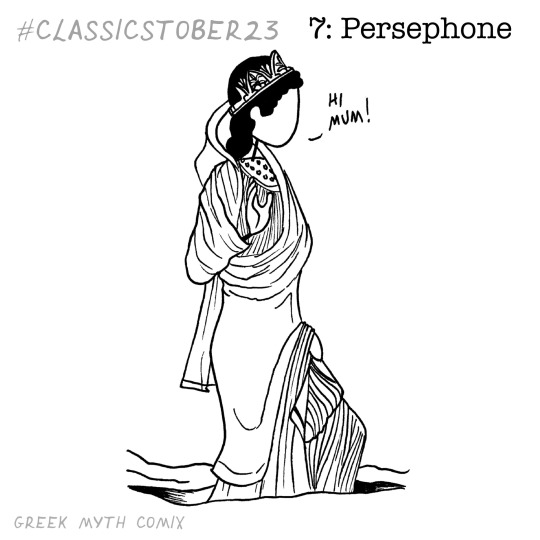
I love this vase illustration. She’s popping up from the underworld, her hand raised in such a familiar gesture. ‘Hi Mum! Look, I’m Queen now!’
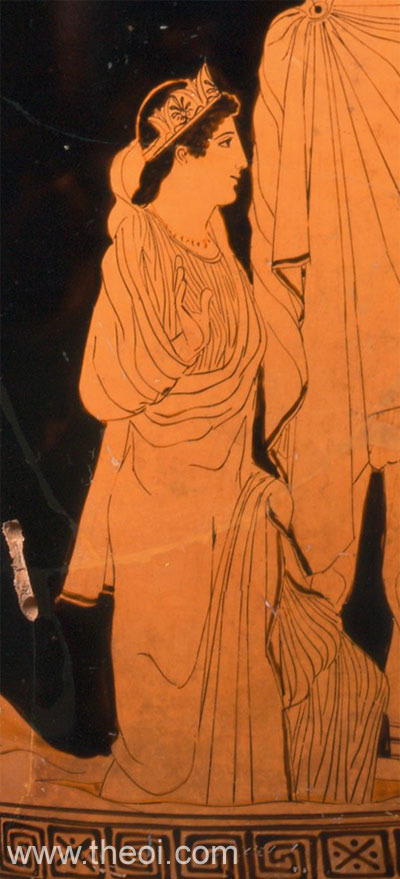
This piece of pottery I’ve used without any changes, save the caption, is an Attic Red-Figure Bell krater currently in the Met, attributed to the Persephone Painter (c.440BCE) - photos from Theoi.com
#greek mythology#tagamemnon#greek myth#illustration#greek myth comix#ClassicsTober#classicstober23#persephone#proserpina
97 notes
·
View notes
Text
Body Fat in Greco-Roman Antiquity (transcribed article)
A long time ago I made a post about the depictions of Dionysos/Dionysus/Bacchus as fat. You can read it here if you want - but that was just me going on about stuff taken left and right, nothing too serious, just thoughts.
I want to bring you today a serious article about the perception of the fat body in Ancient Greece and Ancient Rome. This article is actually a page hosted on "Google Arts and Culture", titled "In the Flesh: Body Fat in Ancient Art". It was created by the J. Paul Getty Museum, and you can read it all here. But the website has a really specific design that makes it hard for some people to read the page, so I thought why not help share it around by copying it below. Of course, nothing belongs to me, I am just transcribing it all (plus copying the images). All credits go to the J. Paul Getty Museum.
In the Flesh: Body Fat in Ancient Art
Ancient Greek and Roman writers criticized bodies of different sizes for a variety of reasons. But in works of art, body fat was often depicted in ways that defy our expectations.
A Different Ideal
Terms like "overweight" and "underweight" originate in modern medicine's concept of an ideal body weight. Calculated to minimize mortality risk, this medically desirable weight varies based on such factors as height, age, and fitness.
Ancient Greeks and Romans compared the appearance of their bodies with respect to a more abstract ideal.
For the ancient physician Galen, measurements for the ideal body were expressed centuries earlier in the Canon, a treatise on statue proportions by the 5th-century BC sculptor Polykleitos:
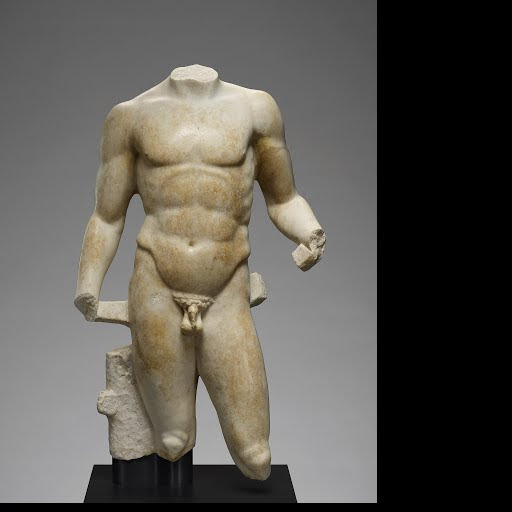
(Male torso, about A.D. 100, Unknown)
"[Neither the overweight nor the underweight body] is in due proportion. But the body which equals the Canon of Polykleitos reaches the summit of complete symmetry."
— Galen, Ars Medica K 343
For the ancient Greeks, precisely measured weight was less important than the perception of symmetry and balance.
They had a term for this desirable state of wellness: εὔσαρκος (eusarkos), meaning "well-fleshed" or "fleshy."
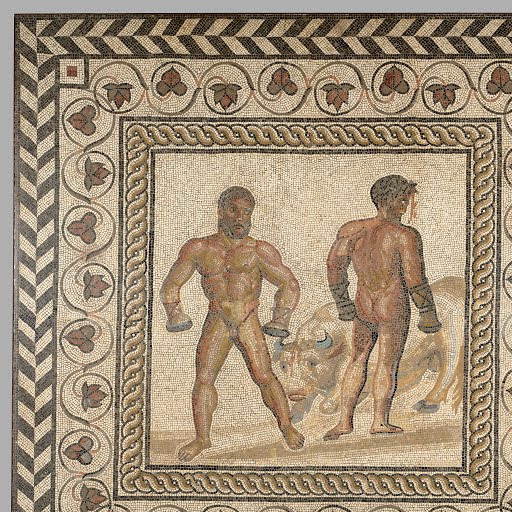
(Mosaic floor with combat between Dares and Entellus, A.D. 175-200, Unknown)
Because the Greeks prized moderation in all things, bodies or behaviors that stood out from this ideal were targets of criticism. Perhaps surprisingly, this criticism also applied to muscular athletes, such as wrestlers and boxers, who required constant high-calorie diets.
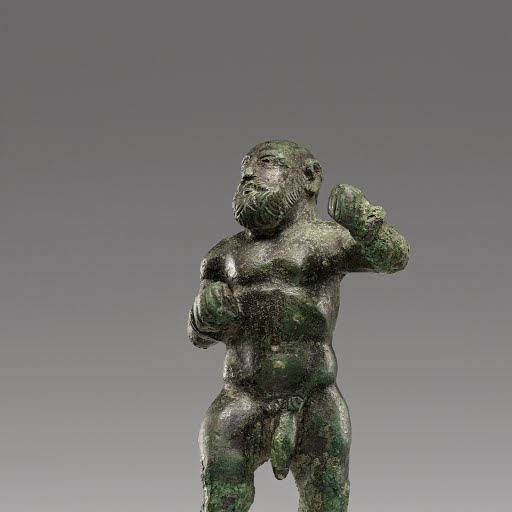
(Statuette of a boxer, unknown)
Big Bodies in Comedy
Mockery of those who ate more or less than necessary was one way to impose social compliance and maintain political order.

(Apulian red-figure bell krater, 370-360 BCE, Cotugno painter)
Many Greek and South Italian vases often depict comic actors wearing "fat suits" (as well as a mask and a phallus) to embody popular character types.
Actors used such props as comic gags, and vase painters often represented them with great care.

On this Apulian mixing bowl, lines extending across the actor's chest make clear that his large, sagging breasts are artificial. His belly is unnaturally circular and hangs too low — further evidence that he is wearing a costume.
It seems that the painter wanted to pointedly emphasize the exaggerated nature of such costumes.
Ample Satyrs
Not all depictions of larger bodies were mocking. Animal ears and the double flute identify this figure as a satyr, or a woodland deity. He reclines in a pose that would remind viewers of the satyrs' master, the wine god Dionsyos, who is often depicted reclining at a banquet.
Instead of on a fancy couch, the chubby old satyr rests on a full wineskin!

(Fragment of an Apulian squat Lekythos, 350-325 BC, Darius painter)
Under tufts of gray hair, lines accentuate the curving folds of the old satyr's body. Unlike the ridiculously artificial bodies of the padded actors, the satyr's big, hairy body is gentle and soft.
Like the plump pillow on which he rests, the satyr appears comfortable and at ease. This scene is meant to be lighthearted, and does not appear cruel or mocking.
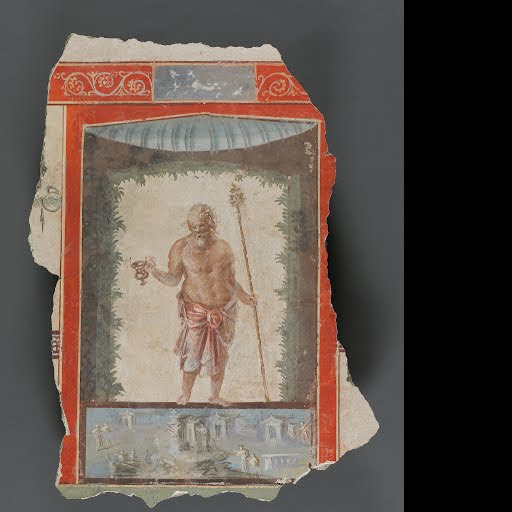
(Fresco fragment depicting an old Silenos with kantharos and thyrsos, AD 1-79, Unknown)
Similar attention to detail can be seen in this Roman wall painting of the old satyr Silenus. The painter’s skillful use of red shadows and pink highlights builds up the volume of his chest and stomach, which appear both soft and sturdy at the same time.
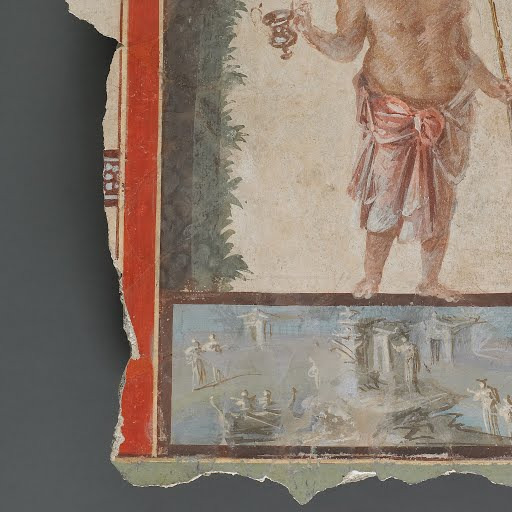
These fleshly older satyrs were symbols of pleasure-seeking and leisure.
Fragile Bodies on the Margins
Skinny or underweight bodies were also criticized, in part because of the association between emaciation and illness. Thinness could also negatively reflect on one's character.

(Miniature skeleton, unknown)
Ancient authors often noted a person's skinny frame as a way of pointing out their intellectual or social irrelevance.
The association of thinness and powerlessness is sometimes exploited in representations of enslaved individuals, domestic servants, and those otherwise marginalized in society.
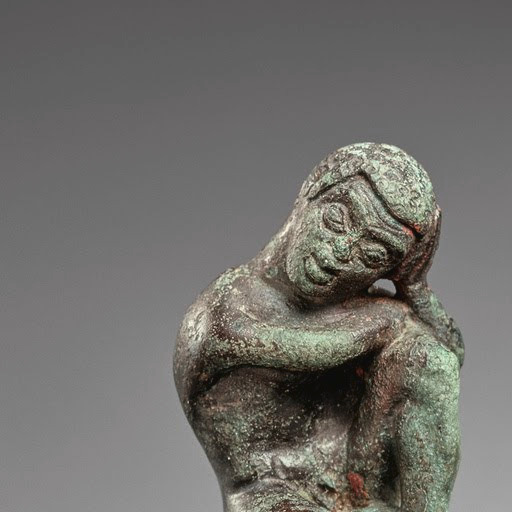
(Finial with a resting youth, unknown)
On this figurine of a resting youth, the individually shaped ribs might suggest that the figure is undernourished.
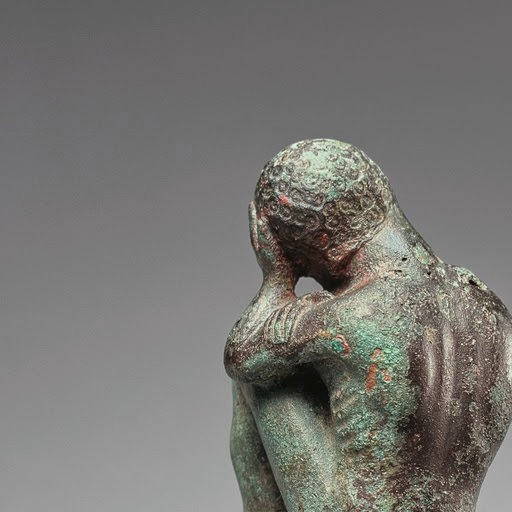
In depictions of older individuals, such as this statuette of an old woman, underweight features are often used to indicate frailty.

(Statuette of an old woman, 100-001 BCE)
Such subjects were popular in the Hellenistic period (c. 330-31 BC) —a time of unprecedented social inequality — and consciously aestheticized:
"When we see emaciated people we are distressed, but we look upon statues and paintings of them with pleasure, because imitation, as such, is attractive to the mind's nature."
- Plutarch, Quaestiones convivales 5.1.
Size and Gender
Body fat was also linked to gender, especially in the Roman Empire. While bodies of women were routinely criticized by Roman authors, fluctuation in weight did not render them less feminine. By contrast, both fat and skinny men were explicitly mocked as effeminate, lacking either physical strength or stamina.
Biographies of unpopular Roman emperors often weaponize their body size in this way. Of the emperor Galba, the biographer Suetonius writes, "it is said that he was a heavy eater," immediately before turning to rumors about his inclinations towards "unnatural desires."
Such fat-shaming seems not to have mattered to the emperors themselves. Their official portraits show little concern for concealing the fullness of their faces.
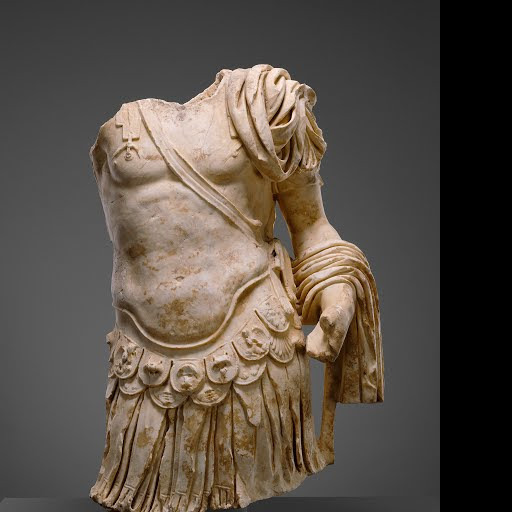
(Torso of a cuirassed statue, unknown)
The situation may have been different in military affairs. The anxieties Roman men felt about their bodies can be seen in their choice of armor. Their bronze breastplates were decorated with chiseled pectorals and washboard abs, creating the illusion of a skin-tight fit.
It is unlikely that such breastplates were meant to deceive, any more than the fat suits of comic actors. What they offered to their wearers was the illusion of inhabiting — for a moment — the ideal body of a Polykleitan statue.
Divine Softness
A closer look at ancient art reveals that the bodies of gods were sometimes less harshly judged than those of mortals.
Depictions of certain gods regularly focus on the softer parts of their bodies.
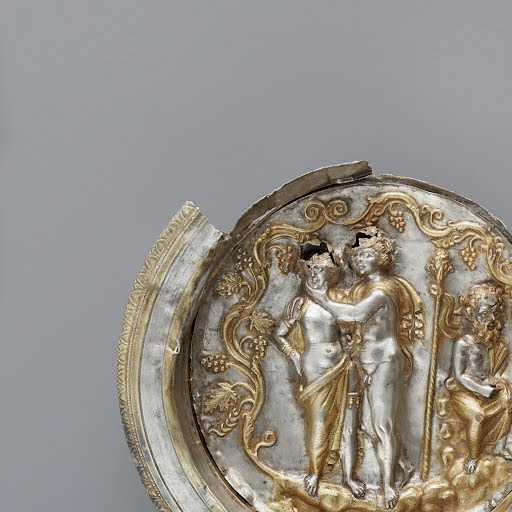
(Bowl with a medallion depicting Dionysos and Ariadne, unknown artist, -100)
The maker of this Hellenistic silver medallion went out of their way to show the curvy bodies of the wine god Dionysus and his wife Ariadne, engraving lines under their bellies to highlight the sensuality of their encounter.
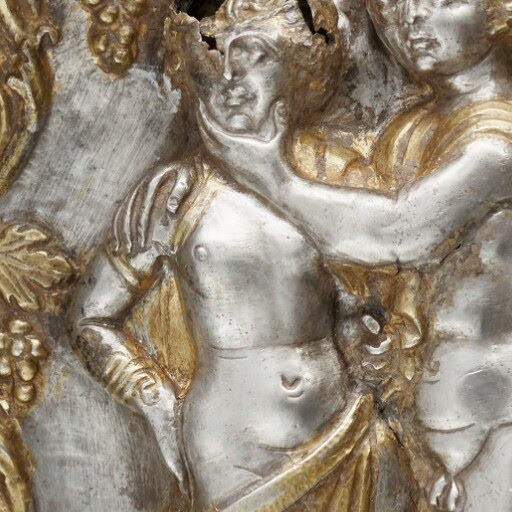
Some popular representations of the love goddess Venus, such as the so-called "Crouching Venus" type, unquestionably emphasize the fleshiness of her body.

Statue of a Crouching Venus Statue of a Crouching Venus, Unknown, A.D. 100–150, Provenant de la collection : The J. Paul Getty Museum
Modern observers have highlighted the positive associations between fleshiness and fertility expressed by a variety of Greek and Roman authors, but there is more to the story.
The rolls of flesh on the goddess's belly also gave the ancient sculptor a means of creating a very intimate encounter between viewer and goddess.
To ancient viewers of all ages and genders, accustomed to seeing gods represented solemn and upright, the crouching pose allowed a glimpse into the goddess's private world.
The crouching goddess seemed more approachable to worshippers, in part because her body moved in ways they could recognize from their own lived experience. The softness of Venus’s body made the cold, hard marble come to life.
#ancient greece#ancient rome#body positivity#fatphobia#greek gods#body fat#venus#dionysus#dionysos#ariadne#roman emperors#satyrs#underweight#satyr#silenus#ancient art#ancient greek art#body types#art#weight#ancient greek society#roman empire
26 notes
·
View notes
Text
Fate Grand Order Servant Comparisons
Penthesilea

Left - FGO
Right - Lucanian red-figure bell-krater, late 5th century BC. Made by the Creusa Painter
#fate grand order#fgo#greek mythology#penthesilea#fgo penthesilea#penthesilea fgo#fate penthesilea#penthesilea fate
11 notes
·
View notes
Text





A little comic based on this

(Apulian red-figured bell-krater, Attributed to The Tarporley Painter, About 375 - 350 BC)
In it Athena is depicted playing the aulos, where she then sees her face in the mirror and feels horrified at the way it distorts her face so throws them away where they will be find by the satyr Marsyas.
12 notes
·
View notes
Text
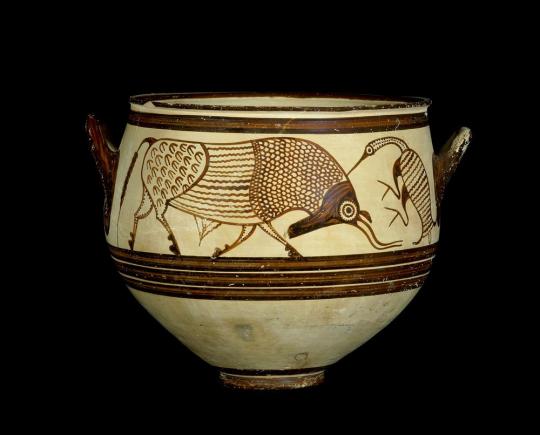
Bell krater, Mycenaean Greece, circa 1200 BC
from The British Museum
275 notes
·
View notes
Text


MASTERLIST.
Call of Duty:
⋆☀︎. Knock Knock (let me in) -> König x reader (oneshot)
⋆☀︎. Half-Starved -> Ghost x reader (oneshot)
Phantom of the Opera:
⋆☀︎. Miasma -> Phantom x reader (oneshot)
Sleep Token:
⋆☀︎. Oh warm, distant June -> Vessel & Sleep (oneshot)
OC works (not x reader):
⋆☀︎. Farewell to Providence -> Knowledge and Brutus
⋆☀︎. Rising Waters -> Knowledge and Brutus
OC works (x reader):
⋆☀︎. Delicate Is The Flesh -> Yan!demon OC x reader (fic):
Prologue
Chapter one: For Whom The Bell Tolls
Chapter two: Corvus and Krater
Chapter three: Belly of the Beast
Chapter four: Something Forgotten
Chapter five: Citrus and Cinnamon
Chapter six: Mumbling Conscious
╰┈➤ Links:
⋆☀︎. Ao3
⋆☀︎. Quotev
#könig x reader#könig x you#ghost x reader#ghost x you#call of duty#cod#cod mw2#phantom of the opera#poto#erik x reader#the phantom x reader#sleep token#original writing#original characters#yandere x reader#mel's musings
20 notes
·
View notes
Text

[Artemis] Mixing bowl (bell krater) with the death of Aktaion and a pursuit scene, early Classical Period Greek, ca. 470 BC., ceramic Red Figure, 37 cm
3 notes
·
View notes
Text
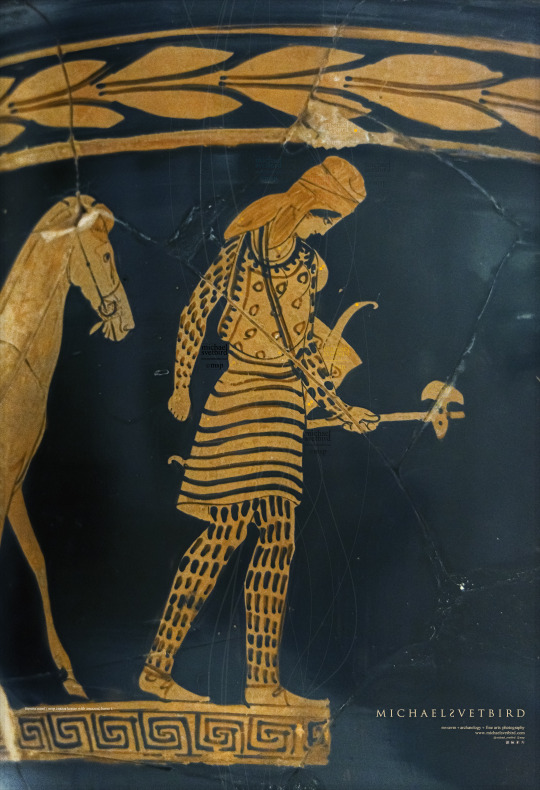
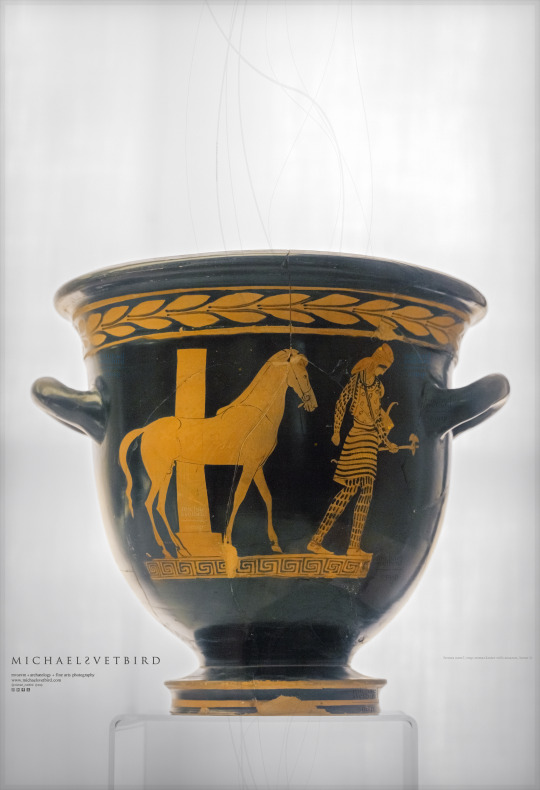
AMAZON Leading a Horse:
Attic Red-figure Bell Krater
Attributed to the Eupolis Painter
[ https://www.wikidata.org/wiki/Q56033758 ]
Ca 440 BC.
From Tomb 203, the Valle Trebba area [near Ferrara], Spina
Side A: an Amazon leads a horse, carrying sagaris;
[Side B: Two young men].
Museo Archeologico Nazionale di Ferrara | MANF
[1st Fl. Sala II]
• Web : http://www.archeoferrara.beniculturali.it/index.aspx?lng=ENG
• FB : https://www.facebook.com/museo.archeologico.ferrara
• IG : @museo_archeologico_ferrara
• X : @ArcheoFerrara
MANF | Michael Svetbird phs©msp | 21|02|24 6000X4100 600 [I., II.]
The photographed object is collection item of MANF, photos are copyrighted
[non commercial use | sorry for the watermarks]
.
#ferrara#emilia romagna#archaeological museum#attica#krater#red figure pottery#vase painting#ancient pottery#greek pottery#ancient art#antiquity#ancient#archaeology#museum#mythology#greek mythology#art history#antiquities#heritage#amazon#αμαζόνα#amazons#amazzone#amazone#oiorpata#warrior woman#art photography#archaeology photography#museum photography#michaelsvetbird
17 notes
·
View notes
Text


a vase depicting the story of actaeon, c. 470 B.C.E, currently in the museum of fine arts at boston // freak nasty by megan thee stallion
image from: https://greekromangods.tumblr.com/post/180271673939/mixing-bowl-bell-krater-with-artemis-and-aktaion
#bolo liveblogs#actaeon#megan thee stallion#web weaving#okay I made a serious actaeon post so now it's time for a silly one#''but bolo actaeon was turned into a deer not a dog'' the joke still makes sense and that's what matters
14 notes
·
View notes
Text

The Medici Vase is a monumental marble bell-shaped krater sculpted in Athens in the second half of the 1st century AD as a garden ornament for the Roman market. It is now in the Uffizi Gallery in Florence.
32 notes
·
View notes